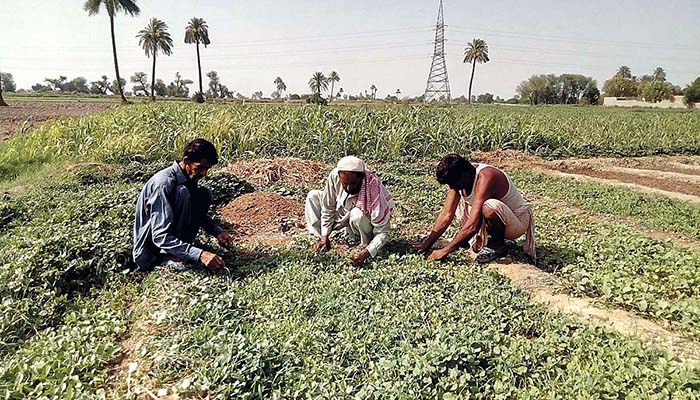Can Naya Pakistan uplift the rural poor?
Elite-led agricultural development priorities must not be allowed precedence over the plight of landless farmers
August 24, 2018

Prime Minister Imran Khan has set an ambitious policy agenda for making Pakistan a more welfare-oriented and equitable society. One vital issue for achieving this ambitious goal is to address the plight of our marginalized rural populace, which has become increasingly disempowered due to the agricultural development policies pursued over the past seven decades.
The significance of the rural poor cannot be understood in terms of economic indicators alone. While the rural economy contributes less than a quarter to our annual GDP, nearly half of our labour-force still works in agriculture. Given the uneven distribution of agricultural land, vast amounts of prime agricultural land are concentrated in the hands of a small number of powerful families, while most smaller farmers in the country own increasingly fragmented land parcels, and an even larger proportion of the rural populace owns no land.
It is the landless farmers who work as sharecroppers, seasonal workers, or as daily waged agricultural labourers, who are the poorest of the rural poor. The situation for rural women is no better. Most rural women are denied their right to inherit property, or they belong to poor landless families and work alongside their men and children for measly wages doing essential agricultural work. This includes weeding, sowing, picking crops or looking after livestock.
It is, therefore, vital to devise an agricultural development policy which can uplift the lives of the landless rural poor. Vested interests of the feudal elite has prevented meaningful land reforms, and the increasing reliance on capital-intensive farming since the ‘Green Revolution’, has made life for landless and cash-strapped farmers increasingly difficult.
A truly revolutionary agricultural development strategy would include offering them decent wages and work conditions, rather than relying on elite-led strategies to boost agricultural yields.
In his recent speech to the nation, our Prime Minister Imran Khan briefly reiterated his resolve to uplift agriculture, conserve water, and conduct agricultural research. During his speech, he was unable to be more specific.
Take the case of conducting agricultural research. What sort of agricultural research does our new prime minister have in mind? Would emphasis be placed on the production of high yield varieties, which require more pesticides and fertilizers, or else on the conservation of indigenous seeds, and on rethinking cropping patterns to ensure food security rather than trying to encourage cash crops to boost export earnings?
The devil of euphemistic policy goals always lies in the details, and in the actual implementation of policies. The Pakistan Tehreek-e-Insaf’s (PTI) election manifesto for 2018 does not outline specific details for reforming agricultural development. A much lengthier agricultural reforms agenda formulated by PTI several years ago did contain more interesting proposals to help improve the lot of smaller farmers, such as creating a support fund based on progressive taxation of larger farmers, which could be a major step in the right direction if successfully implemented. Khan’s party had also promised an ‘Employment Guarantee for Rural Youth’, ensuring least 90 days of employment per year specifically to the unemployed landless rural youth, to work on tree plantation and rural infrastructure schemes. How much emphasis such efforts will be given now that the PTI is in power remains to be seen.
Many of the electables in PTI own large sugar and cotton mills. Senior PTI advisors have been experimenting with agri-business models such as corporate farming. Corporate farming can offer yield high profits and productivity, but they evidently exacerbate land scarcity for landless sharecroppers and do not offer displaced farmers on-farm jobs due to their reliance on agricultural machinery. The jobs that leading corporate farms in our country have offered to daily waged women or seasonal workers pay below minimum wage rates, and they offer no job security or even written contracts.
Elite-led agricultural development priorities must not be allowed precedence over the plight of landless farmers. If that happens, tokenistic measures such as the provision of high-interest micro-loans to the rural poor will not prove enough to stem the tide of unsustainable urbanization and lingering rural deprivations, even if our agricultural productivity marginally increases.
Ali is a development anthropologist.
Note: The views expressed are those of the author, and do not necessarily reflect the official policy or position of Geo News or the Jang Group.











